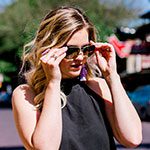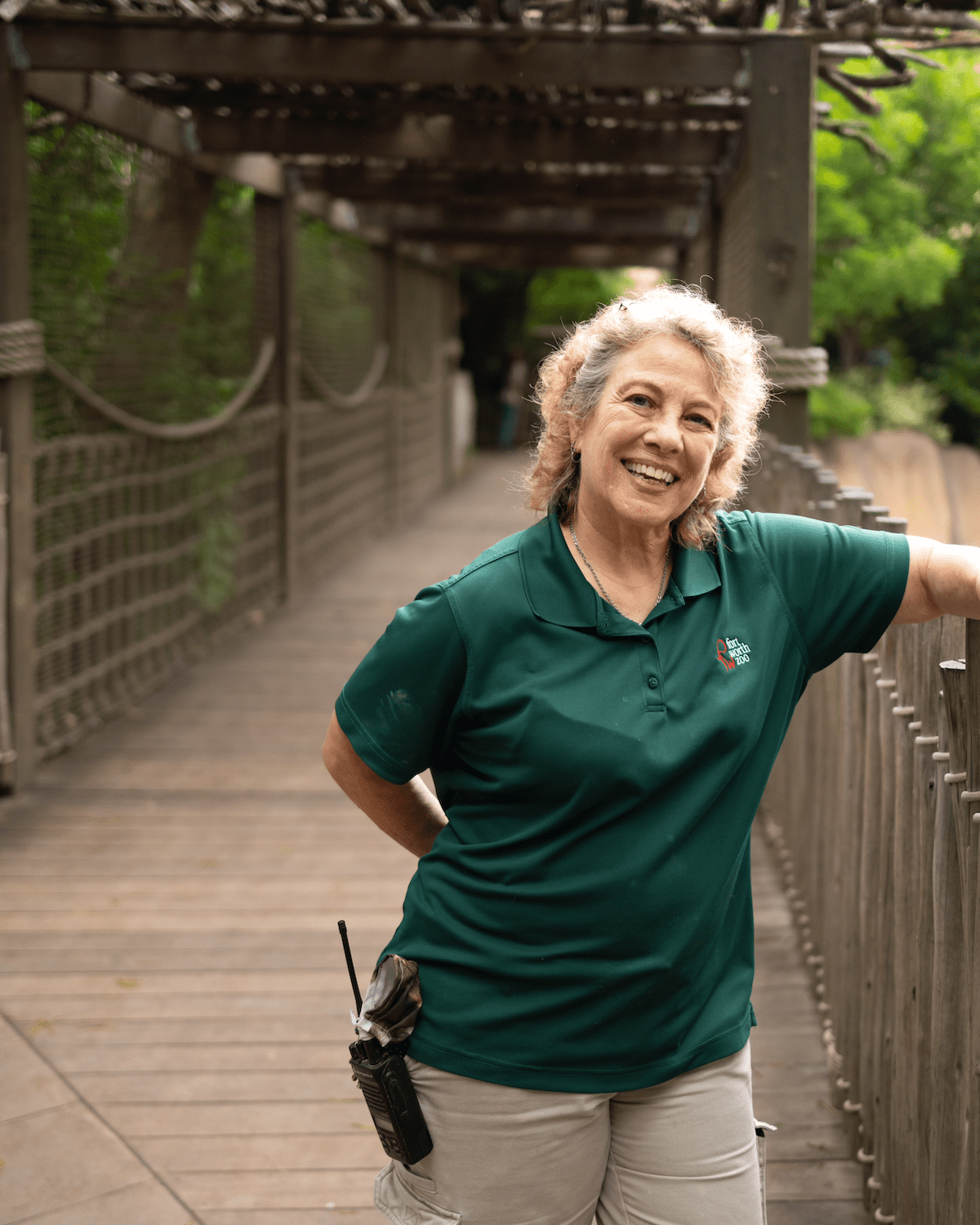
ANNOUNCING THE WOMAN OF THE MONTH
Fort Worth women are making headlines daily as business owners, entrepreneurs, top management officers, and political leaders. So, here at Fort Worth Woman, we are selecting one of our city’s shining stars each month. These are the movers and shakers you need to know, and we are proud to honor their accomplishments as our WOMEN OF THE MONTH.
Linda Roberts
Primate Supervisor at the Fort Worth Zoo
Despite all that, there is no better feeling for me than to watch the primates bed down for the night after eating and knowing they had a good day. They deserve the best I can give them. I work for them above all else.
Meet May’s Fort Worth Woman! In every community, there are figures whose dedication and passion become the pulse of collective aspirations. For the city of Fort Worth, Linda Roberts, the Primate Supervisor of the esteemed Fort Worth Zoo, embodies a legacy of service, love of animals, and undeterred inspiration. From her modest roots in the Bronx, New York, where a visit to the local zoo sparked her dream, to her current position as a leader in primate care, Linda’s life tells a story of commitment and impact.
Linda’s calling found her at the Bronx Zoo, whereas a young girl, she witnessed a moment that would shape her future. Surrounded by the majestic presence of wildlife, she made a promise to her seven-year-old self — a promise she has fulfilled over decades, becoming a beacon of duty and ardor in the field of wildlife conservation. Linda recalls, “On one of those visits I saw a woman in the gorilla habitat with three baby gorillas. I said to my mom, “When I grow up that’s what I want to do. Sixteen years later, I found myself in the same exact gorilla habitat with two baby gorillas and I spied a little blonde-headed girl telling her mother, “That’s what I want to do.” Talk about life being a circle! I was instantly brought back to my childhood and realized I was exactly where I always wanted to be.” It is a tale straight from the pages of a heartwarming novel — a girl from a bustling metropolis, touched by a scene at the zoo, and, in time, becoming part of its systems, her presence a stirring echo of her childhood resolve.
Undeterred by obstacles, Linda pursued her passion for animal care, achieving her degree in Physical Anthropology/Biology with a specialization in primates, a subject close to her heart since her earliest encounters at the Bronx Zoo. Linda explains, “I was interested in studying primates and how they relate to human evolution. I started volunteering at the Zoo as an extracurricular activity for my master’s program and fell in love with zookeeping. During the 80s at the Bronx Zoo, I found myself in unique and spectacular situations. I was working with gorillas when the Central Park Zoo decided to send their four animals to the Bronx. I helped plan and execute numerous gorilla introductions. Watching how individual animals navigate their new social surroundings was remarkable.” Her academic prowess, coupled with a burgeoning compassion for nature, led her to her first role as a zookeeper, a title she wears with honor and distinction today.
Linda’s reflections on her career indelibly speak of challenges, yet these are surpassed by the immense joys that accompany her profession. The role of zookeeper is one that the average observer does not fully comprehend. It involves an unparalleled level of commitment — a 24/7 job where the well-being of the animals comes before all else. Linda describes, “You can ask for holidays off but don’t expect to get every Christmas or Thanksgiving. You have got to share those with your coworkers. Zoos are also nonprofit organizations, so you will not be making a killing, financially. Those are the basics. Now add that the animals are in their habitats during the day for public viewing. Where are the zookeepers? In the night holding areas, cleaning the animals’ “bedrooms.” After that they need to prepare the animal diets. So, the day is quite busy with “caring” for the animals, not just watching them. You will also be expected to repair things the animals break or refurnish the exhibits. You must nurse them through illnesses and worry about their safety. Despite all that, there is no better feeling for me than to watch the primates bed down for the night after eating and knowing they had a good day. They deserve the best I can give them. I work for them above all else.” From cultivating feed to attending to medical needs, a keeper’s tasks are never-ending and crucial to the lives of these wild creatures they cherish.
Her experiences with the great apes at numerous introductions as well as observing their behaviors in response to the new surroundings taught her the art of flexibility. Linda states that this flexibility showed her that, “You need to read the animals and their behaviors accordingly. No matter how well you plan things out, there is usually a curve ball that you didn’t expect. I find life in general does the same thing to folks. Each one of us has a plan, and sometimes things don’t go according to that plan. It’s how well you can pivot and bounce back from setbacks and how gracious you are with the good surprises, that matters”. Her comparison of zookeepers to the work of nurses, police officers, or firemen is particularly poignant, as it encapsulates the selflessness and continuous dedication that are hallmarks of her profession.
Arriving at the Fort Worth Zoo during a significant period of expansion as they were constructing the new World of Primates around 1992, Linda embraced her role with zeal and dedication. The new World of Primates building provided a canvas for her growing expertise, her repertoire now extending beyond gorillas. Linda explains this time, “The Fort Worth Zoo was getting new habitats and new animals. It was another wonderful opportunity to work with animals in a brand-new setting. Gorillas will always be the ape I am most comfortable with, but I wanted to expand my knowledge working with other apes and the Fort Worth Zoo offered the perfect setting. When they opened the World of Primates building, it housed all four great ape species. We had gorillas, orangutans, chimpanzees and bonobos. Bonobos are very rare in managed populations and Fort Worth Zoo is the only zoo in Texas to house a breeding group of the crazy, yet fascinating animals native to only one country in the world (the Democratic Republic of Congo). So what I learned over the years is your approach is different with each species of ape. What works with a gorilla does not necessarily work with an orangutan. Again, curve ball, pivot; flexibility is the key.”
Linda’s personal reflections on her career and the relationships she’s developed with both animals and the community are a testament to her humility, her genuine love for the creatures under her care, and her profound philosophy on life. She speaks of the animals she tends to as friends, relationships that have left an indelible impact on her own life’s narrative.
Her commitment to the conservation of primates and the many lessons she imparts to visitors and aspiring zoologists alike are delivered with a blend of wisdom and approachability. Linda is not just a zookeeper; she is an educator and a conduit for fostering respect and understanding between humans and the animals that share our planet.
When reflecting on our city as whole, Linda’s role in fortifying the Fort Worth Zoo’s status within the community cannot be overstated. From becoming one of the faces of public engagements at events like “Boo at the Zoo” to her seamless integration into the heart of Fort Worth’s friendly and community-centric culture, Linda’s presence has become a treasured part of the local fabric. She describes the ‘friendliness’ of Fort Worth further, “When I was working around the Zoo, strangers would say hello to me. It was awkward at first, but I didn’t realize it was because I was simply in uniform. I kept trying to figure out if I knew them. Yes, I love that Fort Worth friendliness! It felt like home. I felt like I belonged, even though I was a Yankee. Folks tell me that after 30 plus years, I still have my New York accent. This openness encouraged me to dress up as the Wicked Witch for the Boo at the Zoo events. I loved those days, getting to interact with the kids and their parents. At one point, it was almost my personal mission to be in each Fort Worth family photo albums, posing as the Wicked Witch with their kids. I think I’m in quite a few albums over the years.”
Linda’s story is a narrative of breaking barriers, not with grand gestures, but with an unwavering focus on her craft which allows the word for herself to be ‘expression’. She states, “I’ve enjoyed sharing my life with more than 40 gorillas during my career and there is no place where I am happier. I feel so lucky to have had a “job” that I never felt was a “job.” It is more of an expression of my soul. It’s just who I am.” Her guidance is not only cherished by her community but has ignited a brighter flame within the hearts of individuals who, like Linda, look at primates not as subjects of fascination, but as guardians of kinship in a shared natural world.
In celebrating Linda Roberts as our Fort Worth Woman, we pay homage to a living testament of what it means to carve a path through life, not for fame or recognition, but out of love — love for the creatures that share our world and the community in which she has found a second home. Her story is one that epitomizes passion and the enduring beauty of a life dedicated to a making the world that much more magical. In this remarkable keeper of the primates, we find a guiding light for those who seek to follow in her footsteps, a mentor capable of showing the way and an embodiment of the heights one can reach by simply following their heart.

Michelle Miles
Author
Michelle has a passion for connecting, encouraging and informing about the good happening in our city. The good people, events, food, stores, entrepreneurs, and good deeds are her focus. She has created a niche for herself by using social media as a native marketing tool that has created meaningful exposure for local businesses in Fort Worth to a wide but very particular local audience.


